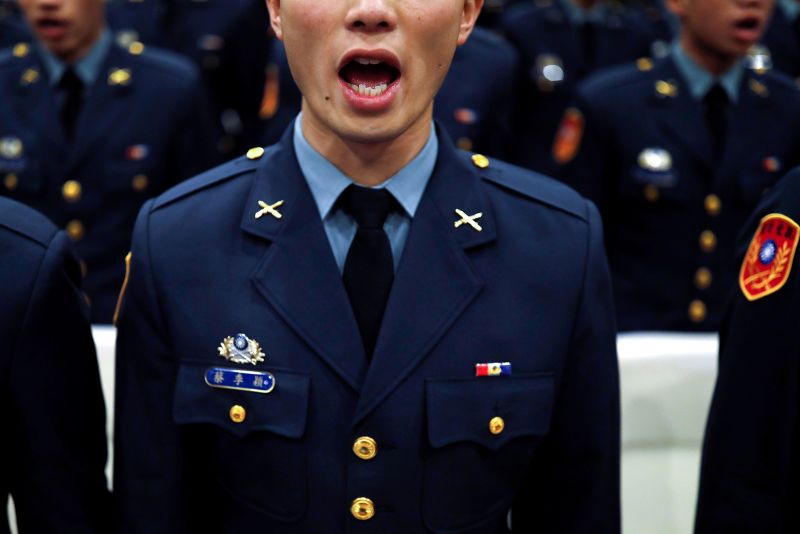 Taipei, Taiwan
Taipei, Taiwan
CNN
—
Taiwan has noticed a growing gap in its defense plans.And it’s not one that can easily be plugged in by increasing the budget or buying more guns.
The island democracy of 23.5 million people faces an increasing challenge of recruiting enough young men to meet its military targets and the Home Office has suggested that the problem is due – at least in part – to its stubbornly low birth rate.
Taiwan’s population fell for the first time in 2020, according to the ministry, which warned earlier this year that military inflows in 2022 would be the lowest in a decade and that a continued decline in the youth population would pose a “tremendous challenge” to the future.
That’s bad news at a time when Taiwan is trying to beef up its troops to deter any possible invasion by China, whose ruling Communist Party has been making increasingly aggressive noises about its determination to “reunite” with the self-governing island – which it never has.done.controlled – by force if necessary.
And the outlook has worsened further with the release of a new report from Taiwan’s National Development Council, which predicts that by 2035 the island can expect to see about 20,000 fewer births per year than the 153,820 it recorded in 2021.By 2035, Taiwan will also overtake South Korea as the jurisdiction with the world’s lowest birth rate, the report said.
Such projections fuel a debate over whether the government should extend the period of compulsory military service that eligible young men must serve.Currently, the island has a professional fighting force of 162,000 (as of June this year) – 7,000 short of the target, according to a report by the Legislative Yuan.
In addition to that number, all eligible men must complete a four-month reservist training course.
Changing the compulsory conscription would be a major U-turn for Taiwan, which had previously tried to reduce conscription and shortened the compulsory conscription from 12 months in 2018.But on Wednesday, Taiwan’s National Defense Minister Chiu Kuo-Cheng said such plans would be made public before the end of the year.
The news has been opposed by some young students in Taiwan, who have vented their frustrations on PTT, the Taiwanese version of Reddit, even though there is widespread support for the move.
A poll conducted by the Taiwanese Public Opinion Foundation in March this year showed that most Taiwanese agreed with a proposal to extend the term of service.
It turned out that 75.9% of respondents thought it was reasonable to extend it to one year; only 17.8% were against.
Many experts argue that there is simply no other option.
Su Tzu-yun, a director of Taiwan’s Institute for National Defense and Security Research, said that before 2016, the pool of men eligible to join the military – either as professional soldiers or reservists – was about 110,000.Since then, he said, the number had declined every year and the pool would likely be as low as 74,000 by 2025.
And within the next decade, Su said, the number of young adults available for recruitment by the Taiwan military could drop by as much as a third.
“This is a national security issue for us,” he said.“The population pool is declining, so we are actively considering whether we should resume conscription to meet our military needs.
“We are now facing an increasing threat (from China) and we need more firepower and manpower.”
Taiwan’s low birth rate — 0.98 — is well below the 2.1 needed to maintain a stable population, but it’s no exception in East Asia.
In November, South Korea broke its own world record when the birth rate fell to 0.79, Japan’s to 1.3 and mainland China’s to 1.15.
Despite this, experts say the trend poses a unique problem for Taiwan’s military given the relative size of the island and the threats it faces.
China has been making increasingly aggressive noises towards the island since August, when then-Speaker of the US House of Representatives Nancy Pelosi made a controversial visit to Taipei.Not long after landing in Taiwan, Beijing also launched a series of unprecedented military exercises around the island.
Temperatures have remained high since then – especially when Chinese leader Xi Jinping told a major Communist Party meeting in October that “reunification” was inevitable and that he reserves the option to take “all necessary measures.”
Chang Yan-ting, a former deputy commander of the Taiwan Air Force, said that while low birth rates were common in East Asia, “the situation in Taiwan is very different” as the island faced “increasing pressure (from China ) and the situation will become more dire.”
“The United States has military bases in Japan and South Korea, while Singapore does not face an acute military threat from its neighbours.
Taiwan faces the greatest threat and the declining birth rate will make the situation even more serious,” he added.
Roy Lee, a deputy executive director of Taiwan’s Chung-hua Institute of Economic Research, agreed that the security threats facing Taiwan are greater than those in the rest of the region.
“The situation is more challenging for Taiwan because our population base is smaller than other countries facing similar problems,” he added.
Taiwan has 23.5 million inhabitants, compared to 52 million in South Korea, 126 million in Japan and 1.4 billion in China.
In addition to the shrinking recruitment pool, the decline in the youth population could also threaten the long-term performance of Taiwan’s economy – itself a pillar of the island’s defense.
According to the London-based Center for Economics and Business Research, Taiwan is the 21st largest economy in the world and had a GDP of $668.51 billion last year.
Much of its economic weight comes from its leading role in the supply of semiconductor chips, which play an indispensable role in everything from smartphones to computers.
Taiwan-based semiconductor giant TSMC is seen as so valuable to the global economy – as well as China – that it is sometimes referred to as part of a “silicon shield” against a possible military invasion by Beijing, as its presence provides a strong incentive for the West to intervene.
Lee noted that population levels are closely tied to gross domestic product, a broad measure of economic activity.A population decline of 200,000 people could result in a 0.4% drop in GDP, all else being equal, he said.
“It is very difficult to increase GDP by 0.4%, and it would take a lot of effort.So the fact that a declining population can take away so much growth is big,” he said.
The government of Taiwan has taken a series of measures to encourage people to have babies, but with limited success.
It pays parents a monthly stipend of TWD 5,000 (US$161) for their first baby, and a higher amount for each subsequent baby.
Since last year, pregnant women are entitled to seven days’ leave for obstetric checks prior to childbirth.
Outside of the military, in the broader economy, the island encourages migrant workers to fill vacancies.
Statistics from the National Development Council showed that there were about 670,000 migrant workers in Taiwan at the end of last year – about 3% of the population.
Most of the migrant workers are employed in the manufacturing sector, the council said, the vast majority of them from Vietnam, Indonesia, Thailand and the Philippines.
Lee said that in the long run, the Taiwanese government will likely need to reform its immigration policies to bring in more migrant workers.
Still, there are those who say that Taiwan’s low birth rate is no reason to panic for now.
Alice Cheng, an associate professor of sociology at Taiwan’s Academia Sinica, cautioned against reading too much into population trends, as they are influenced by so many factors.
She pointed out that just a few decades ago, many demographers were warning of food shortages due to a population explosion.
And even if the low birth rate persists, that wouldn’t be a bad thing if it reflected an improvement in women’s rights, she said.
“The educational expansion that took place in East Asia in the 1970s and 1980s has profoundly changed the status of women.
It really pushed women out of their homes because they had knowledge, education and career opportunities,” she said.
“The next thing you see globally is that once women’s education levels improved, fertility rates started to drop.”
“All of these East Asian countries are really scratching their heads trying to think about policies and interventions to increase fertility rates,” she added.
“But if that’s something[women]really don’t want, can you push them to do that?”.
